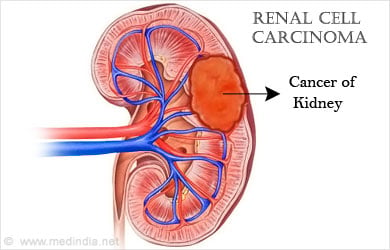- Barjorin D. Tumors of the kidney, bladder, ureters, and renal pelvis. In: Goldman L, Ausiello D, eds. Cecil Medicine. 24th ed. Philadelphia, Pa: Saunders Elsevier; 2011:chap 2003.
- National Comprehensive Cancer Network. National Comprehensive Cancer Network Clinical Practice Guidelines in Oncology: Kidney Cancer. 2012. Version 1.2012.
About
Renal cell carcinoma is kidney cancer that affects the lining of the kidney tubules. The initial stages of the cancer are asymptomatic in most patients and this makes early management of the disease difficult.
Renal cell carcinoma accounts for about 3% of all adult cancers and is also the most common of kidney cancers (90-95%) affecting mostly men, between the ages 50-70 years.

Renal cell carcinoma is commonly seen to affect North Americans and those of Scandinavian ancestry more often than it affects people of Asian or African descent. In the United States, Blacks are more affected than the Whites. Also, the incidence in men is greater than that seen in women. Although the disease is usually detected after age 50, it is seen to occur in young people too who have a family predisposition.
Renal cell carcinoma (RCC) is known for its lack of early symptoms and resistance to treatments such as chemo and radio therapy. However, of late, it has been noticed that these cancers are being detected early and managed through treatments such as thermal ablation, nephron –sparing surgeries, with radical nephrectomy (removal of the kidney and surrounding structures) being the gold standard in treating central and large tumors. Also, targeted therapy is being effectively applied in those with metastatic disease, where the cancer has spread to other parts of the body.


















